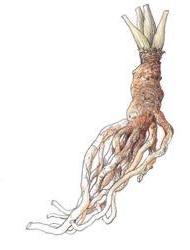
Patient Information Center
Articles




Patient Information Center... Eastern Nutrition
Eastern nutrition is a way of using foods as healing medicinals to bring
your body to a state of balance. Eastern nutrition and Chinese
Herbology view foods as medicinals by evaluating there properties such as
tastes, temperatures, qualities and channel relationships. For example, the first stage of a common cold due to a
wind cold invasion one could use foods with warm properties, such as miso
soup with scallion stalks (cong chi tang), or ginger or cinnamon twig to
fight the cold invasion.
relationships. For example, the first stage of a common cold due to a
wind cold invasion one could use foods with warm properties, such as miso
soup with scallion stalks (cong chi tang), or ginger or cinnamon twig to
fight the cold invasion.
By visiting an Chinese Herbologist or Eastern Nutritionist, they will be able to help you determine your body's pattern and help you get on the right path.
Determining your diet involves many factors such as lifestyle, conditions and underlying patterns. For example: Yin deficiency is a pattern that in common in relation to menopause where a patient may present with a malar flush, night sweats and may display certain tongue and pulse signs. To keep it simple yin deficiency is heat in the body created by deficiency not excess. In this case your nutritionist may recommend foods that have cooling properties.
When discussing the nature of foods it is important to understand it is not necessarily the temperature of the food or substance but it's property. Yes, not to confuse anyone, when they say drink water at room temperature or the Spleen which plays a strong function in digestion in Chinese medicine likes warm they are talking about the temperature. But it is important to understand that foods all have properties. If you eat a large piece of ginger, which is warm in nature, like the kind they give you when you eat sushi, it might make you sweat as it is warm in nature. If you take that same piece of ginger and freeze it and eat it cold it is still warm in nature even though it is cold in temperature.

